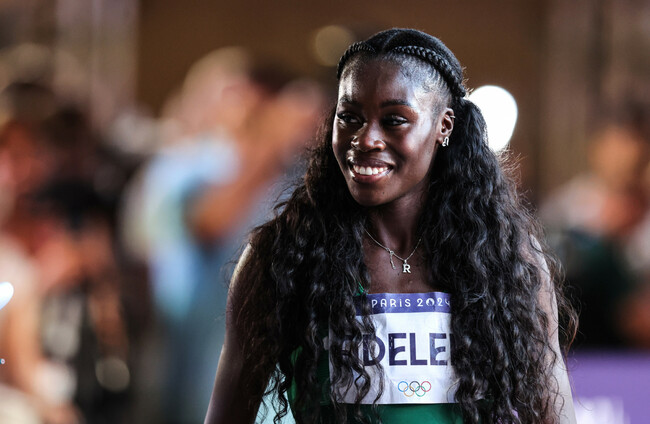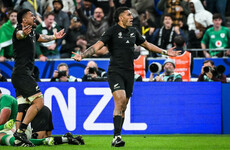WHAT DOES ONE say when the thing that you want, the only thing you really want, doesn’t happen? That you have to wait more than a year for another chance to even try again.
Crossing the finish line in Stade de France, Rhasidat Adeleke looked up and heartbreak was realised. Fourth again.
Fourth in a international final, just as in the World Championships in Budapest 2023.
Mere minutes after that comedown, athletes are obliged to talk to the rights-holding press assembled in their pens.
Much has (rightly) been made this week of how lucky the watching audience and the Irish athletes are that in the RTÉ’s corner is former athlete David Gillick. Primed with the innate knowledge of an elite competitor, the broadcaster also matches his high level of research with empathy and understanding. It’s a mix that allows the athletes – of all ages, not just the ones he knows from days gone by – to trust him in their moments of elation or despair.
For Rhasidat last night, that sympathetic trust allowed for seconds of therapeutic silence, eventually punctuated by a flat, ‘I don’t know’.
Over 2.5 minutes, the 21-year-old shifted to the future.
“I just hope there is more to come.”
Later, when faced with at least a dozen other Irish journalists, including The 42 and The Journal, her conversation was a jumble of disappointment, future wishes and determination.
“I didn’t achieve my dreams today but in the future I just hope that there are more podiums up there and I’ll be able to perform at my best when it’s most important.
“It just wasn’t meant to be today. It’s my first Olympics. I’m grateful to be healthy and just going forward I want to be exactly where I want to be, and in the future that’s what I’m going to be working towards.
“I’m hungrier than ever.”
The race itself is a foggy 49.28 seconds to Adeleke.
I literally can’t even remember what happened but all I know is I didn’t get podium and that’s all I remember.
“I was just staring at the screen for a minute, ‘Oh my God, no way I came fourth again’. I’m like, ‘Can someone just give me the medal?’”
A global medal. That’s the destination. But is it the destiny?
Sport is sport. It’s not an exam. It’s not controlled. It’s not, despite titles, an individual pursuit.
There are always others. Women ready to beat Olympic records. Women returning from anti-doping-related bans. Women who have years’ more experience. Women who have just won NCAA titles just as you did when you were in university.
So, in one light, there are no positives. The withering look to the journalist who even deigned to ask the question exposed the true nature of the ambition.
“Some people, I guess, come here to participate and just happen to be at the Olympics. Their goal is to become an Olympian. I knew what I was capable of. I was definitely looking at a podium. I definitely wouldn’t be happy coming fourth and my coach knows I could’ve got on that podium.
“I think my priorities are slightly different. At the end of the day it’s a competition. Yeah the Olympics are a special moment and I’ve definitely appreciated that, I’ve appreciated being here, I’ve appreciated the moment and I’ve taken it in. But I definitely was performance focussed.”
As the minutes tick on, disappointment festering, the athlete knows she needs to turn it into something greater. That’s the job.
“It just wasn’t meant to be today but I think I still have so much more to give. We’ll just look forward to the future.”
“I’m sure there was something I could do differently, I’ll see what my coach has to say. Honestly it’s over now, and I’ve just got to look forward now.”
Eventually, as the distance from the end line lengthens, she starts to really analyse what happened.
“Honestly, the whole thing is kind of like a blur,” she says. “Coming into the home straight I was somewhere in contention, but maybe I panicked a little bit, started to strain.
“It’s just a whole blur, I literally can’t even remember what happened but all I know is I didn’t get podium and that’s all I remember,” she repeats.
“At the end of the day, I think it comes with experience.”
Gold medalist Marileidy Paulino is 27 years old. Salwa eid Naser and Natalia Kaczmerek are both 26.
“I also think there’s so much more to come in the 400m, so much more experience, so many more races to be able to learn how I should run my race the best,” Adeleke says, getting to the heart of her fourth place finish.
“I think going forward it’s just about repetition and being able to put down a perfect race plan that fits me.”
It’s all a learning curve, even being at the Olympic Games.
“The [nerves] weren’t too bad once I got into the stadium,” the Tallaght woman tells us. “I was definitely nervous more so this morning, kind of being in my own thoughts but I think once I got out here I was just accepted it for what it is and put my best foot forward.”
Adeleke’s star lies in the fact that her talent landed her in medal contention long before experience should allow.
Fourth when she still has the training wheels on. She needs extra strength down that final 50 metres. She needs to plan how to win a medal, execute that race and then repeat, repeat, repeat.
Adeleke’s ambition lies in the fact that she wanted it last night, and knew it was within her grasp.
The reasons for fourth, and there are many, came from the commentary around her. For the 21-year-old, there was just disappointment and motivation for the next chance.
“I don’t think it was anything beyond what I could do.”
She goes again in the 4x400m relay Olympic final.
Written by Sinead O’Carroll and posted on TheJournal.ie











David Gillick as the track side reporter has been a masterstroke from RTE. Honestly, having people who know what it’s like to be competing being there interviewing the athletes is so refreshing. No empty plaudits, no templated questions, just honest interview with a bucket load of understanding and empathy.
@B: ya he was a shining light for how punditry ought be. Kudos to him
@B: Michael Johnson on the BBC is brilliant as well, although not so sure about our own Sarah Mulkerrins doing the track side reporting for the Beeb.
@The Firestarter: wonder how she really feels same with conor mcnamara on bbc radio 5 supporting GB bit cringe since they both irish its there job i suppose
She used to be a 100 metre sprinter, then became a 200 sprinter. I wonder how she would have done in those races at Olympics? Appeared to me the 400 metres was a little too far for her
@WqM9AAv3: 300 metre perfect
@WqM9AAv3: her times at 100 and 200 won’t get her into the Olympics never mind medal contention. 400 is her distance. She will medal at this distance over her career if she keeps fit. Injuries will be her nemesis going forward, we’ve lost a lot of promising athletes to injury over the last number of years – Gina Apke Moses, Patience Gumbo, Ciara Neville etc etc
@B: well her pb would have gotten her 7th in the 200m final. Considering she’s not training specifically for that event, she possibly could be around 4th or 5th in that event too.
@Greg: fair point on the 200m but still splitting hairs. By no means an expert but I expect the diminishing returns at 100 and 200 are greater than 400. To go from back of the field to medal at 100 and 200 is far more difficult than doing so in 400 I would imagine.
So it would seem her best bet for gold in 2028 and to medal in 2032 would be to stick to 400m and with luck keep injury free